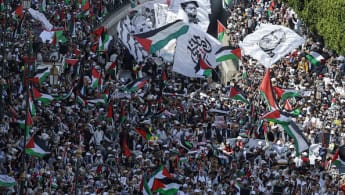Thousands of Moroccan workers took to the streets of the capital on Thursday, transforming traditional May Day demonstrations into a powerful protest against the government’s ongoing ties with Israel amid the war in Gaza.
While labour demands such as wage increases and job security remained central to the march, chants of “Bread, Freedom, Palestine” echoed through the crowds, with protesters waving Moroccan and Palestinian flags side by side. Banners condemning Israel’s actions in Gaza and Morocco’s normalisation of relations with Tel Aviv were prominently displayed.
Union leaders, many wearing the symbolic Palestinian keffiyeh, strongly criticized what they described as Israel’s “systematic genocide” in Gaza and demanded an end to diplomatic normalization. Abdelilah Dahman of the National Union of Workers in Morocco (UNTM) declared the syndicate’s firm support for Palestinian resistance and rejection of any continued ties with Israel.
Political figures also joined the protest, including Idriss Azami of the Justice and Development Party (PJD), who called for the full liberation of Palestine and reiterated the party’s shift in position since Morocco signed the normalization deal in 2020.
Public outrage over the Gaza conflict has intensified since October, with Moroccan trade unions emerging as vocal opponents of the government’s stance. Last month, port workers pressured shipping companies over alleged arms deliveries to Israel, part of broader boycott efforts supported by the BDS movement.
Thursday’s demonstration also highlighted domestic grievances. Protesters decried inflation, restrictions on civil liberties, and a controversial strike law seen as curbing labour rights. Some marchers symbolically wore shackles or taped their mouths shut, representing growing repression and solidarity with persecuted journalists and activists.
Despite a strong police presence, the protest remained peaceful, stretching across Rabat’s main avenues for hours. The Democratic Confederation of Labour (CDT) described the day as a struggle for “bread, freedom, and justice — beyond borders.”
Though talks between unions and the government have resumed in recent months, progress has been minimal. Analysts warn that Morocco’s labour tensions are once again nearing a crisis point.
“We are here to fight against injustice — in Morocco and Palestine — and to reject normalization with the Zionist entity,” said unionist Khaled Satti during the rally.



